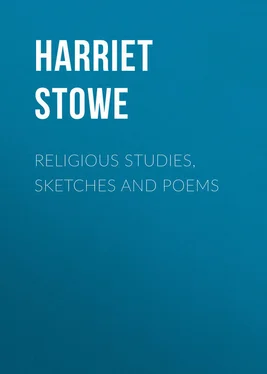Harriet Stowe - Religious Studies, Sketches and Poems
Здесь есть возможность читать онлайн «Harriet Stowe - Religious Studies, Sketches and Poems» — ознакомительный отрывок электронной книги совершенно бесплатно, а после прочтения отрывка купить полную версию. В некоторых случаях можно слушать аудио, скачать через торрент в формате fb2 и присутствует краткое содержание. Жанр: foreign_prose, на английском языке. Описание произведения, (предисловие) а так же отзывы посетителей доступны на портале библиотеки ЛибКат.
- Название:Religious Studies, Sketches and Poems
- Автор:
- Жанр:
- Год:неизвестен
- ISBN:нет данных
- Рейтинг книги:5 / 5. Голосов: 1
-
Избранное:Добавить в избранное
- Отзывы:
-
Ваша оценка:
- 100
- 1
- 2
- 3
- 4
- 5
Religious Studies, Sketches and Poems: краткое содержание, описание и аннотация
Предлагаем к чтению аннотацию, описание, краткое содержание или предисловие (зависит от того, что написал сам автор книги «Religious Studies, Sketches and Poems»). Если вы не нашли необходимую информацию о книге — напишите в комментариях, мы постараемся отыскать её.
Religious Studies, Sketches and Poems — читать онлайн ознакомительный отрывок
Ниже представлен текст книги, разбитый по страницам. Система сохранения места последней прочитанной страницы, позволяет с удобством читать онлайн бесплатно книгу «Religious Studies, Sketches and Poems», без необходимости каждый раз заново искать на чём Вы остановились. Поставьте закладку, и сможете в любой момент перейти на страницу, на которой закончили чтение.
Интервал:
Закладка:
This being the case, what impresses us most in the character of Jesus, as a reformer, is the atmosphere of peacefulness that surrounded him, and in which he seemed to live and move and have his being.
Human beings as reformers are generally agitated, hurried, impatient. Scarcely are the spirits of the prophets subject to the prophets. They are liable to run before the proper time and season, to tear open the bud that ought to unfold; they become nervous, irascible, and lose mental and physical health: and, if the reform on which they have set their heart fails, they are overwhelmed with discouragement and tempted to doubt divine Providence.
Let us now look at Jesus. How terrible was the state of the world at the time when he began to reflect upon it in his unfolding youth! How much was there to be done! What darkness, cruelty, oppression, confusion! Yet he, knowing that that was the work of reorganizing, showed no haste. Thirty years was by Jewish law the appointed time at which a religious teacher should commence his career. Jesus apparently felt no impulse to antedate this period; one incident alone, in his childhood, shows him carried away beyond himself by the divine ardor which filled his soul.
Even then, his answers to his mother showed the consciousness of a divine and wonderful mission such as belonged only to one of the human race, and it is immediately added, "And he went down to Nazareth and was subject to them." Eighteen years now passed away and nothing was known of the enthusiastic spirit. When he appears in the synagogue at Nazareth, he is spoken of simply as "the carpenter." "How knoweth this man letters?" was the cry of his townsmen.
Nothing shows more strongly the veiled and hidden and perfectly quiet life that Jesus had been leading among them. He had been a carpenter, not a teacher. The humble, calm, unobtrusive life of a good mechanic, who does every day's duty in its time and place, is not a thing that calls out any attention in a community. There are many followers of Jesus in this world who are living the same silent, quiet life, who would not be missed in the great world if they were gone, who, being always in place and time, and working without friction or jar, come to be as much disregarded as the daily perfect work of nature.
The life of Jesus must also have been a silent one. Of all the things that he must have been capable of saying we find not one recorded. And the wonder of his townsmen at his capacity of speech shows that there had been no words spoken by him before to accustom them to it.
In our Saviour's public career we are surprised at nothing so much as his calmness. He was never in haste. His words have all the weight of deliberation, and the occasions when he refrains from speech are fully as remarkable as the things he says.
There seems to be about him none of the wearying anxiety as to immediate results, none of the alternations of hope and discouragement that mark our course. He had faith in God, whose great plan he was working, whose message he came to deliver, and whose times and seasons he strictly regarded. So, too, did he regard the mental and spiritual condition of the imperfect ones by whom he was surrounded. "I have many things to say to you, but ye cannot bear them now," he said even to his disciples. When their zeal transcended his, and they longed to get hold of the thunderbolts and call down fire from heaven, his grave and steady rebuke recalled them: "Ye know not what manner of spirit ye are of."
We see his disciples excited, ardent, – now coming back with triumph to tell how even the devils were subject to them, now forbidding one to cast out devils because he followed not them, now contending who should be greatest; and among them sits the Master, lowly, thoughtful, tranquil, with the little child on his knee, or bending to wash the feet of a disciple, the calmest, sweetest, least assuming of them all.
This should be the model of all Christian reformers. He that believeth shall not make haste is the true motto of Christian reform.
And these great multitudes, to whose hands no special, individual power is given – they are only minute workers in a narrower sphere. Daily toils, small economies, the ordering of the material cares of life, are all their lot. Before them in their way they can see the footsteps of Jesus. We can conceive that in the lowly path of his life all his works were perfect, that never was a nail driven or a line laid carelessly, and that the toil of that carpenter's bench was as sacred to him as his teachings in the temple, because it was duty.
Sometimes there is a sadness and discontent, a repressed eagerness for some higher sphere, that invades the minds of humble workers. Let them look unto Jesus, and be content. All they have to do is to be "faithful over a few things," and in his own time he will make them "ruler over many things."
VIII
THE PRAYER-LIFE OF JESUS
The Bible presents us with the personality of a magnificent Being – the only-begotten Son of God – who, being in the form of God and without robbery equal with God, emptied himself of his glory and took upon him the form of a servant; and, being found in fashion as a man, humbled himself and became obedient to death – even the death of the cross.
This great Being, we are told, entered the race of mortality, divested of those advantages which came from his divine origin, and assuming all those disadvantages of limitation and dependence which belong to human beings. The Apostle says, "It behooved him in all respects to be made like unto his brethren." His lot was obedience – dependence upon the Father – and he gained victories by just the means which are left to us – faith and prayer.
Now, there are many good people whose feeling about prayer is something like this: "I pray because I am commanded to, not because I feel a special need or find a special advantage in it. In my view we are to use our intellect and our will in discovering duties and overcoming temptations, quite sure that God will, of course, aid those who aid themselves." This class of persons look upon all protracted seasons of prayer and periods spent in devotion as so much time taken from the active duties of life. A week devoted to prayer, a convention of Christians meeting to spend eight or ten days in exercises purely devotional, would strike them as something excessive and unnecessary, and tending to fanaticism.
If ever there was a human being who could be supposed able to meet the trials of life and overcome its temptations in his own strength, it must have been Jesus Christ.
But his example stands out among all others, and he is shown to us as peculiarly a man of prayer. The wonderful quietude and reticence of spirit in which he awaited the call of his Father to begin his great work has already been noticed. He waited patiently, living for thirty years the life of a common human being of the lower grades of society, and not making a single movement to display either what may be called his natural gifts, of teaching, etc., or those divine powers which were his birthright. Having taken the place of a servant, as a servant he waited the divine call.
When that call came he consecrated himself to his great work by submitting to the ordinance of baptism. We are told that as he went up from the waters of baptism, praying, the heavens were opened and the Holy Ghost descended upon him, and a voice from heaven said, "Thou art my beloved Son, in thee I am well pleased."
Might we not think that now the man Jesus Christ would feel fully prepared to begin at once the work to which God so visibly called him? But no. The divine Spirit within him led to a still farther delay. More than a month's retreat from all the world's scenes and ways, a period of unbroken solitude, was devoted to meditation and prayer.
Читать дальшеИнтервал:
Закладка:
Похожие книги на «Religious Studies, Sketches and Poems»
Представляем Вашему вниманию похожие книги на «Religious Studies, Sketches and Poems» списком для выбора. Мы отобрали схожую по названию и смыслу литературу в надежде предоставить читателям больше вариантов отыскать новые, интересные, ещё непрочитанные произведения.
Обсуждение, отзывы о книге «Religious Studies, Sketches and Poems» и просто собственные мнения читателей. Оставьте ваши комментарии, напишите, что Вы думаете о произведении, его смысле или главных героях. Укажите что конкретно понравилось, а что нет, и почему Вы так считаете.












